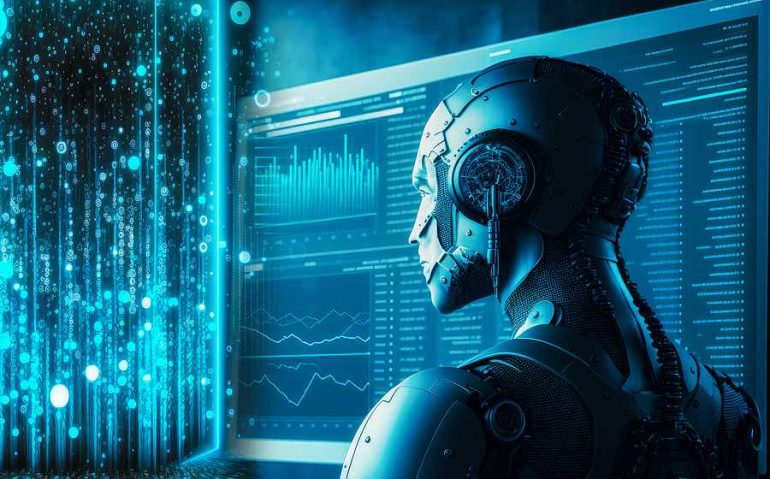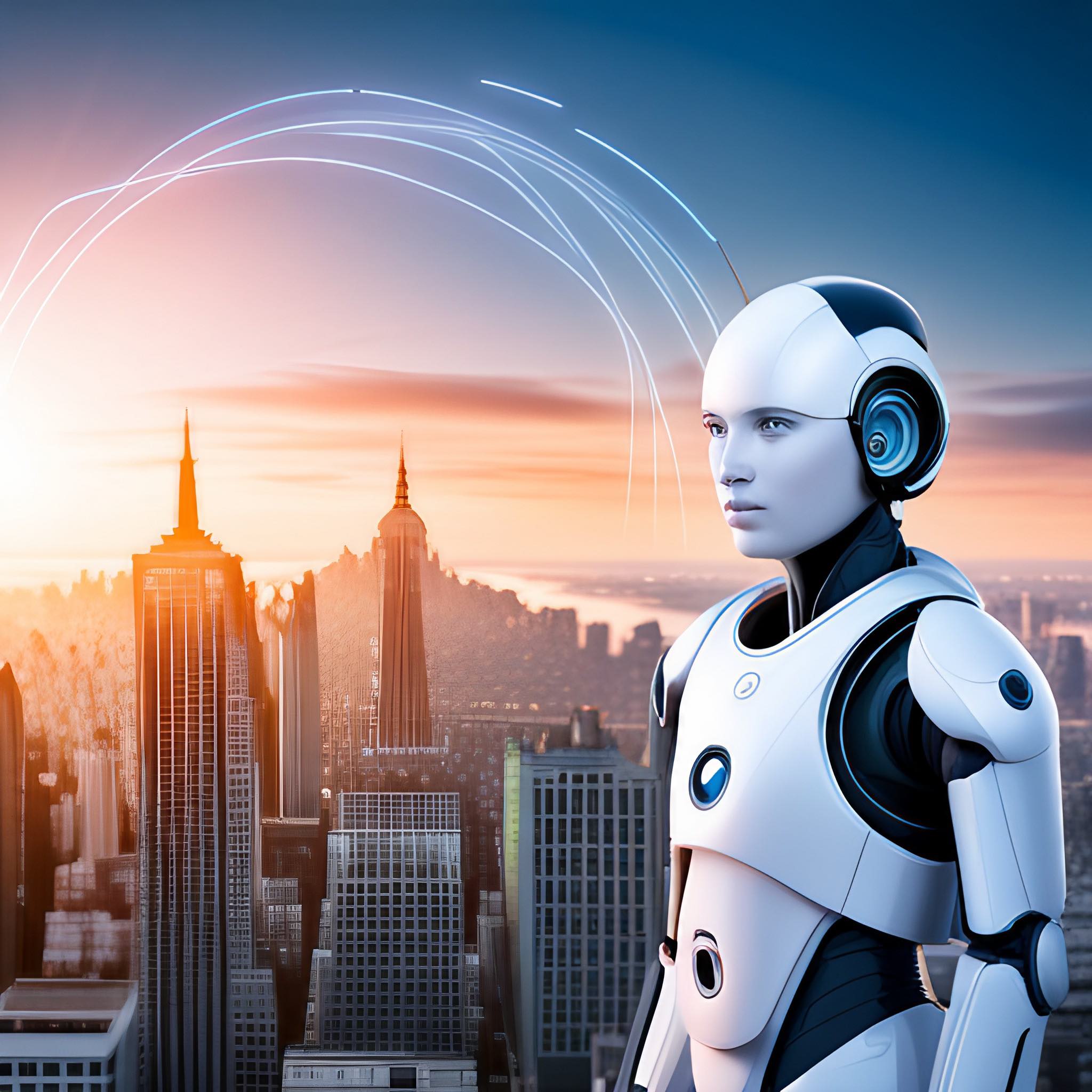Artificial Intelligence (AI) has shaken up businesses’ operations, but it’s not just about making a profit. AI has also significantly impacted humanity and has helped enhance Healthcare, education, and research. In this blog, we’ll explore the positive impact of AI in these areas.
What is the positive impact of AI on humanity?
Enhancing Healthcare and saving lives:
AI has transformed the healthcare industry by streamlining processes and improving patient care. Doctors and hospitals can make better diagnoses, track diseases, and develop personalized treatment plans with AI-powered devices and tools.
For example, AI-powered chatbots have helped patients receive 24/7 health advice in seconds. At the same time, machine learning algorithms have increased diagnostic accuracy for diseases like cancer. AI can help healthcare providers detect patterns in patient data that humans cannot. This could lead to new treatment options and potential cures.
Healthcare providers using AI will have more spare time for patients thanks to the automation of repetitive tasks. This could not happen without the help of machine learning and other AI technics.
AI is changing the healthcare industry, and many companies are leveraging this technology to provide better care for patients. Here are three examples of companies using AI for Healthcare:
Augmedix is an AI-powered platform that helps physicians streamline their workflow and improve patient care.
Google Health/DeepMind – Google Health/DeepMind is a leader in AI-driven healthcare solutions. They specialize in developing algorithms to analyze medical data and predict patient outcomes.
Augmedix: Augmedix is an AI-powered platform that helps physicians streamline their workflow and improve patient care. Natural language processing is used to create notes from doctor-patient conversations. This helps doctors to have more time with their patients.
CloudMedX Health is an AI-based platform. It helps healthcare providers identify high-risk patients. It also provides personalized care plans. The platform uses predictive analytics to detect patterns in patient data and suggest interventions that can help improve outcomes.
Improving education and personalized learning:
AI has made it possible to offer personalized learning experiences that cater to each student’s unique strengths and weaknesses. AI-powered tools can determine the best instructional strategies and provide real-time feedback by analyzing student data. Educators can provide custom-tailored assignments, assessments, and curricula for students, improving academic performance and student engagement.
AI-powered tools can aid educators in recognizing students in danger of lagging behind. This enables educators to provide timely interventions to avert academic difficulties.
Several companies are leveraging AI to improve education and provide personalized learning experiences. Here are some examples:
Knewton: Knewton is an adaptive learning platform. It AI to create personalized student learning paths based on their needs and progress.
The platform analyzes student performance data. It then adjusts the content and pacing of the course. This helps each student achieve their learning goals.
Carnegie Learning: Carnegie Learning offers AI-driven math curricula and tutoring software for K-12 students. Their MATHia platform uses AI to adapt to each student’s skill level. It provides personalized feedback and guidance to help them master math concepts effectively.
Querium: Querium offers an AI-powered platform for STEM (Science, Technology, Engineering, and Mathematics) education. Their StepWise Virtual Tutor uses artificial intelligence (AI) to provide personalized guidance. This guidance is designed to help students solve complex problems in mathematics, chemistry, and physics. It does this by breaking the problems down into steps.
Streamlining business operations and boosting efficiency:
AI has tremendous potential to improve the efficiency and productivity of businesses. From automating routine tasks to giving insights into consumer behavior, AI empowers firms with information that can improve their operations.
AI-powered chatbots allow companies to provide customers with personalized support without human assistance. Machine learning algorithms can help identify inefficient business processes, where they can be streamlined. These improved efficiencies can help businesses save time and money and, most importantly, create more productive and satisfied employees.
The world of technology is constantly changing. Artificial Intelligence (AI) is becoming more and more important for streamlining business operations and increasing efficiency. Here are three AI companies that are leading the way:
IBM: IBM is a leader in artificial intelligence, with its efforts centering around IBM Watson, an AI-based cognitive service. This service helps businesses automate processes and make decisions quickly and accurately.
Cohere Technologies: Cohere Technologies is another startup that uses AI to help businesses optimize their operations. The company’s AI platform can automate tasks. Examples include scheduling meetings, managing customer relationships, and analyzing data. This data can provide insights to improve efficiency.
Advancing scientific research and discoveries:
AI has significantly advanced scientific research and discovery by helping researchers analyze massive amounts of data and find patterns they couldn’t detect. For example, AI-powered tools can analyze massive data sets and predict new drug targets to develop treatments faster and more efficiently. Similarly, AI-powered tools can help researchers identify patterns across vast amounts of scientific data, leading to new discoveries and breakthroughs.
With AI, businesses can operate more efficiently, educators can provide personalized learning experiences, researchers can make new discoveries, and doctors can improve patient care. The positive impact of AI on humanity is clear, and it will continue to transform industries and evolve how we live, work and learn. Business owners, in particular, must leverage AI in their processes to streamline operations, increase productivity, and provide a better customer experience. AI is a prime example of the ingenuity of humans and technology working together to benefit society.
How AI Can Drive the Betterment of Humanity
Artificial Intelligence (AI) can potentially change the world, starting with business operations and decision-making efficiency and accuracy. AI technology has the power to shape the future of humanity positively. We often think of driverless cars and robots replacing humans in factories when discussing AI. Still, AI is not limited to these applications.
In fact, AI can be utilized for the betterment of humanity by solving some of the world’s biggest problems, including environmental sustainability, disaster response, social initiatives, and promoting inclusivity and accessibility.
AI-powered solutions for environmental sustainability
AI technology can help us preserve the environment by assisting in waste management, developing renewable energy sources, tracking and analyzing climate patterns, and reducing carbon footprints. For instance, AI can help to automate waste sorting, segregating biodegradable and non-biodegradable wastes, and identifying recyclable items. This will reduce the amount of non-biodegradable waste dumped in landfills and oceans. AI systems can also identify renewable energy sources and optimize energy consumption in homes and industries, limiting carbon emissions.
AI in disaster response and emergency management
AI can respond quickly and effectively in times of crisis, such as natural disasters or pandemics. AI-driven emergency management systems can analyze and map disaster scenarios, identifying which areas need the most urgent assistance. For instance, drones armed with AI technology can help to identify survivors and topographical surveys in disaster-prone regions.
AI can also assist in predicting natural disasters, warning, and mitigation. AI-powered chatbots and virtual assistants can help with emergency communication. They provide fast and efficient communication to those who need it most.
AI-driven social initiatives and humanitarian aid
AI can help to support social initiatives and humanitarian aid by improving access to essential services. AI-powered predictive analytics can assist in identifying people from marginalized communities that need support, aiding in better utilization of resources. AI can also help efficiently allocate funds by identifying areas, people, or projects that have been overlooked or neglected. AI can help address issues like food insecurity, healthcare inequalities, and education access through personalized service delivery.
AI in promoting inclusivity and accessibility
AI technology can also be used to promote inclusivity and accessibility. AI can help in making vital information more accessible through speech recognition. AI can also help develop assistive technology for people with disabilities, including visual, physical, or hearing impairments. For instance, AI-powered devices can aid in speech recognition and autonomous vehicles to make transportation more accessible for disabled people.
Assistive applications can also improve decision-making and communication for people with cognitive impairments.
The utilization of AI technology for the betterment of humanity can solve some of the world’s most significant challenges. We can leverage AI to reduce waste, create renewable energy sources, respond to natural disasters and emergencies, and promote inclusivity and accessibility.
AI can help us to create an equitable society where everyone has equal access to the necessities of life. Business owners should take the lead in driving the use of AI technology in solving these global challenges, promoting social responsibility, and giving back to society. By doing this, businesses can create a more sustainable future for themselves and the world.
AI Impact on Industries
Artificial Intelligence (AI) is no longer a buzzword reserved for tech enthusiasts and sci-fi fans. It has become an essential part of our daily lives, transforming how we interact with technology, each other, and the world around us. From automated chatbots to self-driving cars, AI technology is changing our world.
Healthcare
The healthcare industry has been a prime beneficiary of AI technology. AI algorithms can analyze vast amounts of patient data, identify patterns. Also generate personalized treatment plans that are far more effective than traditional methods.
Healthcare providers use AI-enabled tools like chatbots, health monitoring wearables, and medical imaging to improve patient outcomes. AI has also assisted drug researchers in identifying new molecules to develop breakthrough treatments for complex diseases.
Manufacturing
AI is transforming the manufacturing industry by automating many tedious and repetitive tasks involved in production. With predictive maintenance, AI algorithms can detect signs of equipment failure before they occur, reducing machine downtime.
Companies can use data from their operations. They can do this by equipping machines with sensors and analytics tools. This leads to improved supply chain efficiencies and better quality control.
Education
In the education sector, AI creates personalized learning experiences for students worldwide. The technology can analyze students’ performance, learning styles, and other metrics to develop custom content tailored to their educational needs. Through the integration of natural language processing, virtual assistants, and chatbots, AI technology is also supporting online learning. This makes education more accessible to people worldwide.
Finance
AI is helping financial institutions to improve the customer experience and streamline operations. The use of chatbots and virtual assistants for customer service. This reduces the cost of hiring more employees while improving response time.
Analyzing transactions and other data, AI-powered fraud detection algorithms identify suspicious activity much faster than traditional methods. In addition, AI technologies enable banks to offer tailored investment portfolios for their customers.
Transportation
The transportation industry is seeing a vast array of innovations through AI technology. Self-driving cars, for instance, are becoming the future of road transportation, improving safety and reducing the rate of accidents. The technology is also aiding logistics companies with real-time route optimization and transportation planning, increasing efficiency and reducing transportation costs.
AI technology is building a new world, empowering humanity, and transforming industries. From Healthcare to transportation, AI is helping businesses to save time, cut costs, and improve their services. It is an exciting time to be in business, and the integration of AI technology is paving the way for a more sustainable future.
Business owners who embrace AI will undoubtedly have a competitive edge over their peers. As the technology continues to evolve, the possibilities for what AI can do are endless.







